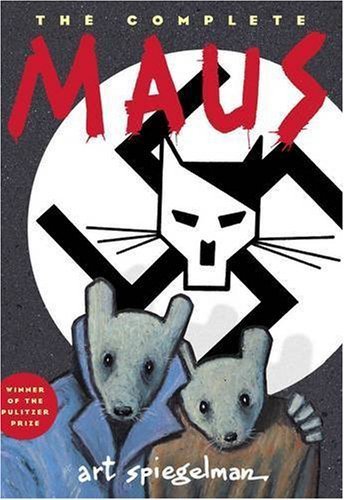
What does the removal of Art Spiegelman’s Maus from the eighth-grade public school curriculum in McMinn County, Tennessee, mean for the future of comic arts censorship? How should concerned members of the comics community respond? The following are excerpts from articles and interviews featuring observations by CBLDF Interim Director Jeff Trexler and Coalition Director Betsy Gomez, with more to follow soon!
Attorney Jeff Trexler, the Interim Director of the Comic Book Legal Defense Fund, said in a statement to Newsweek that the ban “illustrates why it’s so important for students to be able to learn analytical thinking through the interpretation of graphic novels.”
“Being able to understand the fusion of word and image is essential to 21st century literacy,” Trexler went on. “Yet if we fail to recognize how this interplay of word and image works, we set ourselves up to make decisions that run counter to our core civic values, just as this school has done.”
Ryan Smith, “Neil Gaiman Blasts Maus Ban, Says ‘One One Kind of People’ Would Do This,” Newsweek (January 27, 2022)
Trexler, who read the McMinn County school board’s January 10 meeting minutes, told Salon that the school officials completely misread the novel.
“To say that Maus promotes violent abuse and dehumanizing language is to show that you don’t understand it,” Trexler said. “Schools are supposed to be in the business of promoting literacy, and this is just one example of how school leaders are using their own illiteracy as justification for keeping children from learning what the adults in charge have not.”
John Skolnik, “Explainer: Why Experts Say the Banning of Maus Is Not Like the Censorship of Huckleberry Finn,” Salon (January 27, 2022)
Trexler also spoke with Forbes about what people can do to stop book bans:
Rob Salkowitz: What can parents and citizens do to prevent this kind of censorship from taking hold in their communities?
Jeff Trexler: It takes tremendous courage. People need to speak out. Not just at school board meetings, but before then. They need to recommend things, communicate how much they value this material and why. Officials assume that if they get one complaint, there are millions more and so they take action. We need to demonstrate the true diversity of the community. There needs to be engagement from the get-go. Right now, we who defend the material are made to be ashamed. They want to stigmatize it, make people afraid to put this on the shelves or in the curriculum. I think it should be the other way around. We need to get people to feel ashamed to raise these objections, because it’s not who we are. That’s not what this country stands for. Get involved, engaged, help people understand. That’s something we can do before controversy starts.
Rob Salkowitz, “‘If They Can Ban Maus, No Work Is Safe’: CBLDF Blasts School Censorship of Award-Winning Graphic Novel,” Forbes.com (January 27, 2022)
When censors come, comics will always be targeted. One point that Trexler raised in the interview is that comics occupy a unique place in the imagination of censors because of their properties as a medium that combines words and pictures.
As he said, “[censors] see images as particularly dangerous, and when you use the ‘bad words’ in combination with pictures, it’s somehow much more objectionable to them than seeing it in plain print. When they discuss bad language, violence, nudity in Maus, they don’t just say it’s problematic in itself. They see it as promoting suicidal ideation, violence. They see representation as making it real. It’s a serious misreading of how comics actually work. It’s a pre-21st century way of reading images.”
Rob Salkowitz, “Of Maus and Men: Comics, Censorship, and What We Can Do About It,” ICV2 (January 31, 2022)
Coalition Director Betsy Gomez and educator Jill Gerber joined The Caption Life Podcast for a conversation with hosts Kevin Stahlecker and Sean Winningham. Gomez pointed out that the ban of Maus is just the latest in a long campaign against intellectual freedom, especially for young people:
“We’ve got a long history of adults being scared of what the kids like. We saw it with comic books in the ‘50s. We saw it with heavy metal music in the ‘80s. We saw it with video games in the ‘90s and even now. There’s an organized and very terrifying movement towards limiting access to information for K-12 students.
“Challenges are on the rise. At end of September of last year, challenges over the previous year were up 60%. The last three months of [2021], they doubled over the previous year. So, it’s a it’s a pretty terrifying landscape and we need to…help people understand that access to information is important, even information you don’t personally agree with.
…
“I think we are going to see some teachers doing what Jill [Gerber] suggests and providing a greater diversity of work for independent and book club reading, but I think we’re also going to see some teachers pulling back from doing that because they’re worried about their jobs and worried about going to jail and so you know I think one of the most important things you can do aside from paying attention to our local elections is supporting teachers and librarians and vocally showing up for them when they need our help.”
Kevin Stahlecker and Sean Winningham, #53 ”Maus” & The McMinn County School Board,” The Caption Life Podcast (February 1, 2022)
CBLDF and its partners have been battling ongoing and organized attempts to censor comics and other books in schools and libraries. The ban of Maus is just the latest — and most high profile — attempt to limit access to information. You can join the struggle by making a donation or reporting censorship today!